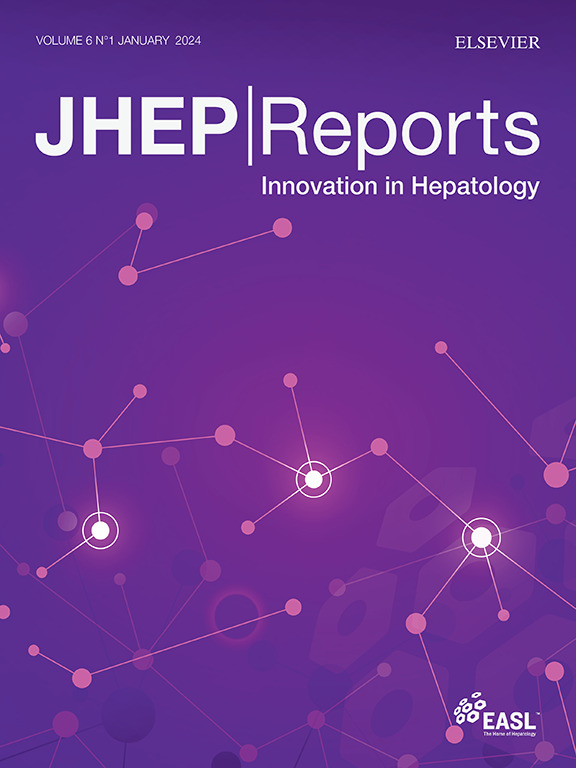Serum FGF21 as a predictor of response to atezolizumab and bevacizumab in HCC
IF 9.5
1区 医学
Q1 GASTROENTEROLOGY & HEPATOLOGY
引用次数: 0
Abstract
Background & Aims
Fibroblast growth factor 21 (FGF21) is a crucial regulator of cell metabolism. Tumour-secreted FGF21 has shown immune-checkpoint factor functions, and high FGF21 levels are associated with a poor prognosis for patients. However, its prognostic value and impact on treatment response in patients with hepatocellular carcinoma (HCC) treated with immune-checkpoint inhibitors (ICIs) remain unclear. Thus, this study investigated the potential of high FGF21 levels as a prognostic marker and whether traditional ICI-based therapy can improve the prognosis of patients with high FGF21 levels.
Methods
In this retrospective multicentre study, patients with unresectable HCC who received atezolizumab/bevacizumab in the NORTE study group (n = 117) were classified into high (≥915 pg/ml; n = 29) and non-high (n = 88) FGF21 groups. For validation, we investigated patients treated with atezolizumab/bevacizumab in an independent cohort (n = 285). Overall survival, progression-free survival, and treatment response were compared between patients with and without high baseline FGF21 levels.
Results
The median overall survival (p <0.001) and progression-free survival (p = 0.045) were significantly shorter in the high FGF21 group than in the non-high FGF21 group. Independent cohort analysis validated these results. In the overall cohort, the median progression-free survival (5.75 vs. 8.84 months; p = 0.027) and median overall survival (14.13 vs. 22.08 months; p <0.001) were significantly shorter in the high FGF21 group than in the non-high FGF21 group. The durable response (≥6 months) + complete response rate was significantly decreased in the high FGF21 group (p = 0.045). No patient with a high FGF21 level achieved a complete response, whereas this was achieved in 4.1% (13/319) of patients with non-high FGF21 levels. Multivariate Cox regression analysis identified high baseline serum FGF21 as an independent poor prognostic factor for overall survival (hazard ratio 2.20, p <0.001).
Conclusions
Serum FGF21 may be a robust, non-invasive prognostic and treatment response marker for unresectable HCC treated with atezolizumab/bevacizumab.
Impact and implications
FGF21 has been reported to act as a secreted immune-checkpoint factor, and elevated levels of FGF21 are associated with a poor prognosis in patients with HCC. It is not fully understood whether ICIs can overcome the impact of high FGF21 levels on the shortened prognosis of patients with HCC. In this multicentre retrospective study, patients with HCC and high baseline levels of serum FGF21 who received atezolizumab/bevacizumab treatment exhibited a significantly shorter overall survival and shorter progression-free survival. These findings suggest serum FGF21 as a robust prognostic marker and an indicator of treatment response in unresectable HCC treated with ICI-based therapy. These findings could be crucial for the implementation of personalised treatment strategies for unresectable HCC. However, identifying optimal therapeutic options for patients with unresectable HCC and high serum FGF21 levels remains an urgent and critical clinical issue.

血清FGF21作为HCC患者对阿特唑单抗和贝伐单抗反应的预测因子
背景,目的成纤维细胞生长因子21 (FGF21)是细胞代谢的重要调节因子。肿瘤分泌的FGF21显示出免疫检查点因子功能,高FGF21水平与患者预后不良相关。然而,其预后价值和对肝细胞癌(HCC)患者免疫检查点抑制剂(ICIs)治疗反应的影响尚不清楚。因此,本研究探讨了高FGF21水平作为预后标志物的潜力,以及传统的基于ci的治疗是否可以改善高FGF21水平患者的预后。方法在这项回顾性多中心研究中,NORTE研究组中接受阿特唑单抗/贝伐单抗治疗的不可切除HCC患者(n = 117)被分为高组(≥915 pg/ml;n = 29)和非高FGF21组(n = 88)。为了验证,我们在一个独立队列中调查了使用atezolizumab/bevacizumab治疗的患者(n = 285)。比较基线FGF21水平高和基线FGF21水平不高的患者的总生存期、无进展生存期和治疗反应。结果FGF21高剂量组的中位总生存期(p <0.001)和无进展生存期(p = 0.045)明显短于非FGF21高剂量组。独立队列分析证实了这些结果。在整个队列中,中位无进展生存期(5.75个月vs 8.84个月;P = 0.027)和中位总生存期(14.13个月vs 22.08个月;p <0.001), FGF21含量高的组明显短于非FGF21含量高的组。高FGF21组持续缓解(≥6个月)+完全缓解率显著降低(p = 0.045)。没有高FGF21水平的患者获得完全缓解,而非高FGF21水平的患者中有4.1%(13/319)获得完全缓解。多因素Cox回归分析发现,高基线血清FGF21是影响总生存的独立不良预后因素(风险比2.20,p <0.001)。结论血清FGF21可能是阿特唑单抗/贝伐单抗治疗不可切除HCC的一个可靠的、非侵入性的预后和治疗反应指标。影响和意义据报道,FGF21作为一种分泌性免疫检查点因子,FGF21水平升高与HCC患者预后不良相关。目前尚不完全清楚ICIs是否能克服高FGF21水平对HCC患者预后缩短的影响。在这项多中心回顾性研究中,HCC和血清FGF21基线水平较高的患者接受阿特唑单抗/贝伐单抗治疗后,总生存期和无进展生存期明显缩短。这些发现表明,血清FGF21是一个强有力的预后标志物,也是不可切除的HCC接受基于ci的治疗反应的指标。这些发现可能对不可切除的HCC的个性化治疗策略的实施至关重要。然而,为不可切除的HCC和血清FGF21水平高的患者确定最佳治疗方案仍然是一个紧迫和关键的临床问题。
本文章由计算机程序翻译,如有差异,请以英文原文为准。
求助全文
约1分钟内获得全文
求助全文
来源期刊

JHEP Reports
GASTROENTEROLOGY & HEPATOLOGY-
CiteScore
12.40
自引率
2.40%
发文量
161
审稿时长
36 days
期刊介绍:
JHEP Reports is an open access journal that is affiliated with the European Association for the Study of the Liver (EASL). It serves as a companion journal to the highly respected Journal of Hepatology.
The primary objective of JHEP Reports is to publish original papers and reviews that contribute to the advancement of knowledge in the field of liver diseases. The journal covers a wide range of topics, including basic, translational, and clinical research. It also focuses on global issues in hepatology, with particular emphasis on areas such as clinical trials, novel diagnostics, precision medicine and therapeutics, cancer research, cellular and molecular studies, artificial intelligence, microbiome research, epidemiology, and cutting-edge technologies.
In summary, JHEP Reports is dedicated to promoting scientific discoveries and innovations in liver diseases through the publication of high-quality research papers and reviews covering various aspects of hepatology.
 求助内容:
求助内容: 应助结果提醒方式:
应助结果提醒方式:


